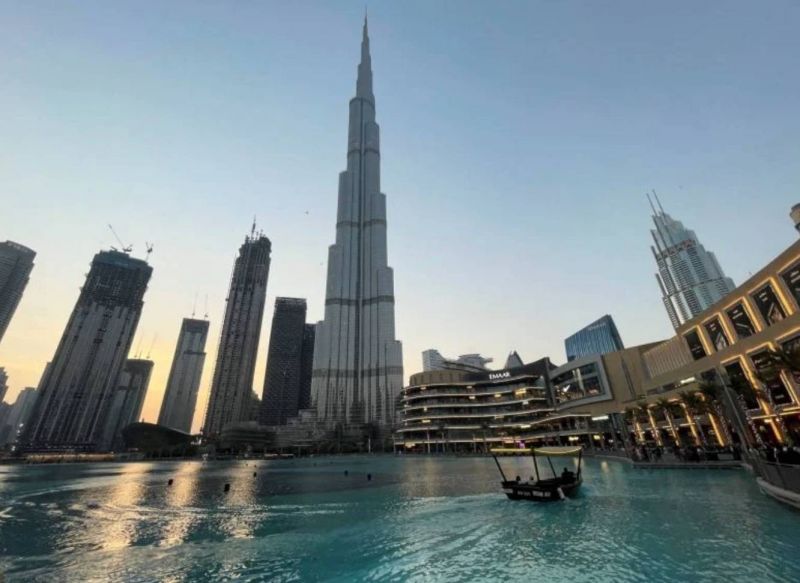
View of the Burj Khalifa and downtown Dubai, United Arab Emirates, September 30, 2021. (Credit: Mohammed Salem/File/Reuters)
Sheikh Mohammad bin Rashid al-Maktoum, UAE Prime Minister and Ruler of Dubai, unveiled Monday the UAE’s Ministry of Investment, which aims to ensure the country’s global appeal as an investment destination.
The ministry will be headed by Mohammad Hassan al-Suwaidi, a former director of an Abu Dhabi-based investment company, who will be responsible for fostering international investment by enhancing the competitiveness and attractiveness of the country’s legislation.
To further strengthen financial stability and preempt potential crises, the UAE will establish a Financial Stability Council, which will be entrusted with monitoring financial risks and proactively addressing emerging challenges.
Riyadh in the firing line
Despite OPEC+’s attempts to maintain high oil prices after the price surge caused by the conflict in Ukraine, oil prices appear to be stagnating. This has led to a decrease in liquidity for countries that rely on hydrocarbon production, posing a threat to their budget planning.
Recognizing the need to diversify its economy beyond oil in anticipation of a post-oil era, Saudi Arabia established a Ministry of Investment as part of its Vision 2030 development plan in 2020.
According to Robert Mogielnicki, a Middle East political economy researcher at Georgetown University, the current global economic conditions and geopolitical uncertainties are not conducive to attracting foreign investment for governments. Therefore, these governments need to take proactive measures to attract outside investment.
In recent months, the Middle East has experienced a noticeable easing of the geopolitical climate, leading to the acquisition of various investments. Abu Dhabi took the initiative to re-establish contact with former adversaries, including Turkey and Iran.
Furthermore, the Iran-Saudi normalization agreement, brokered by Beijing and signed on March 10, offers Riyadh temporary protection against attacks launched by the Houthi rebel group from Yemen, which is backed by Tehran.
However, this stabilization has also sparked economic competition among rival Gulf governments, each striving to attract top foreign investors and skilled workers.
“The establishment of this new ministerial entity by the UAE clearly indicates the presence of economic competition in the region, particularly with Saudi Arabia,” Mogielnicki said. “The UAE is engaged in an intense [economic] battle with Saudi Arabia.”
International companies with a presence in Saudi Arabia received a warning that, starting from 2024, they must establish a regional headquarters in the Kingdom or possibly lose access to government contracts. This move is intended to entice multinational corporations, especially those currently headquartered in Dubai, the traditional financial hub of the Gulf region, to establish themselves in Saudi Arabia.
In response to the potential outflow of capital, Sheikh Mohammad al-Maktoum, the Emir of Dubai, initiated his “D33” plan at the beginning of the year. The objective of this plan is to position Dubai as one of the world’s top three financial centers within the next decade.
Setting course for COP 28
Competition between Saudi Arabia and the UAE is not limited to economic matters. It extends to the realm of soft power, with both countries working to project a modern image on the global stage.
In line with this objective, Saudi Arabia is currently seeking support for its bid to host Expo 2030.Dubai successfully hosted the event in 2020. Additionally, Dubai is set to host the COP28 climate conference in November, further bolstering its international presence.
With less than five months remaining until COP28, Abu Dhabi appears to be accelerating its efforts to achieve carbon neutrality by 2050. Green energy has been established as a central pillar of the Emirati economy, with the newly formed ministry at its core.
Sheikh Mohammad bin Rashid al-Maktoum emphasized this commitment, stating in a tweet, “Our goal will be to triple the contribution of renewable energies over the next seven years.”
Dawud Ansari, a researcher at the Berlin-based Stiftung Wissenschaft und Politik, highlights that promoting investment in green technologies enhances the UAE’s bargaining power. He emphasized that the UAE aims to showcase its expertise in this field at the upcoming COP conference.
To achieve its goals, the UAE has implemented a strategy for the advancement of electric vehicles, aiming to reduce energy consumption in the transportation sector by 20 percent. Additionally, the UAE plans to collaborate with the Chinese company WeRide to introduce autonomous vehicles.
Undoubtedly, Abu Dhabi, along with other Gulf petro-monarchies, perceives the energy transition as a long-term goal requiring funding from fossil fuel revenues. Consequently, there are no immediate plans to abandon hydrocarbons. This is evident in the appointment of Sultan Ahmad al-Jaber, the head of the Emirati oil company Adnoc, as the chair of COP 28, underscoring the ongoing importance of the hydrocarbon sector for the Emirati government.
This article was originally published in French in L'Orient-Le Jour. Translation by Sahar Ghoussoub.